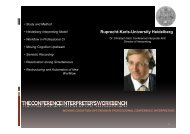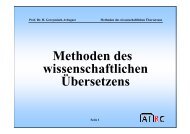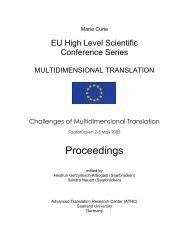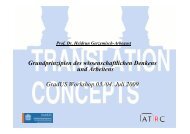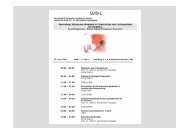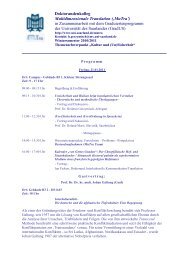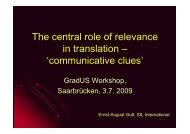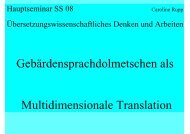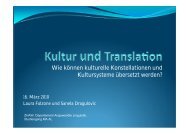Proceedings - Translation Concepts
Proceedings - Translation Concepts
Proceedings - Translation Concepts
You also want an ePaper? Increase the reach of your titles
YUMPU automatically turns print PDFs into web optimized ePapers that Google loves.
MuTra 2006 – Audiovisual <strong>Translation</strong> Scenarios: Conference <strong>Proceedings</strong><br />
Pilar Orero<br />
As such the impression of what is called “reality TV”, matches exactly the concept of<br />
“hyper-reality” mentioned above: “This news item is a media simulacrum which is taken for<br />
real life” (Barker 2006: 3).<br />
Returning to the insert of Bin Laden speaking “VOICE OF TRANSLATOR”, it needs<br />
to be emphasized that such insert has not been used for any other political personality or<br />
footage in all the archives of the BBC news online videos, which raises the question of why<br />
the translator’s presence was so openly acknowledged here. While in some countries such as<br />
Spain and Catalonia, translators and their associations lobby for the recognition of authorship<br />
of their translations, in other countries such as in the Middle East, and more particularly in<br />
Iraq, translators prefer to go unnoticed due to the risk involved in rendering such translations.<br />
Examples are given on the webpages by Campagna and Sabra (2004), Human Rights Watch<br />
(2006) or in the Daily Times (2004), e.g.: “I expect to be killed at any moment. But I have to<br />
work to live” or “I’m supporting my husband. We have to feed and clothe our baby”. In Iraq<br />
alone, “nine fixers, translators and drivers have been killed in 2004, while at least a dozen<br />
others have been threatened, attacked or injured” (Witchel 2004: 6, cited in Venter 2005: 48).<br />
James Dunnigan (2003) and Kadhim Ali (2006) present a chilling account of the role<br />
and fate of translators and interpreters in Iraq. Dunnigan (2002) in the Strategy webpage 4<br />
gives advice on how to recruit a translator in Iraq:<br />
You want your new translator to understand that he has to play by American rules while he's on<br />
the payroll. This is why you want an Arab speaking soldier or Department of Defense civilian to<br />
explain this touchy stuff in his native language, to avoid any misunderstanding or unintended<br />
insults. There are also religious and ethnic differences in Iraq that could make things dangerous for<br />
an Iraqi translator going into the wrong neighborhood. So you have to find out if your applicant<br />
can deal with that.<br />
A possible answer is that - given the many fatwa issued in recent years to writers and<br />
journalists (which in itself is news content) - the profession has decided to play it safe. When<br />
a news item is considered to be a “sensitive” issue translators wish to detach themselves from<br />
the content in order not to be held responsible for the translation content (and in the above<br />
example for voicing Bin Laden words), although in fact they are only doing their job as<br />
professionals as the journalists do also.<br />
8 The format of the material<br />
Different formats lend themselves particularly well to the feeling of hyper-reality, such as<br />
video-conferencing. By filming a video-conference, the overall sensation is that it is taking<br />
place in real time. In the above example of Eduard Punset we have the presenter sitting down<br />
in the studio and the interviewee who is clearly not there in person, is projected on a wall.<br />
4 StrategyPage gives you rapid access to military news. We report these events as history, not headlines, and<br />
provide concise, comprehensive and easy-to-understand descriptions of the troops, their equipment and why<br />
wars the world over are being fought.<br />
178



